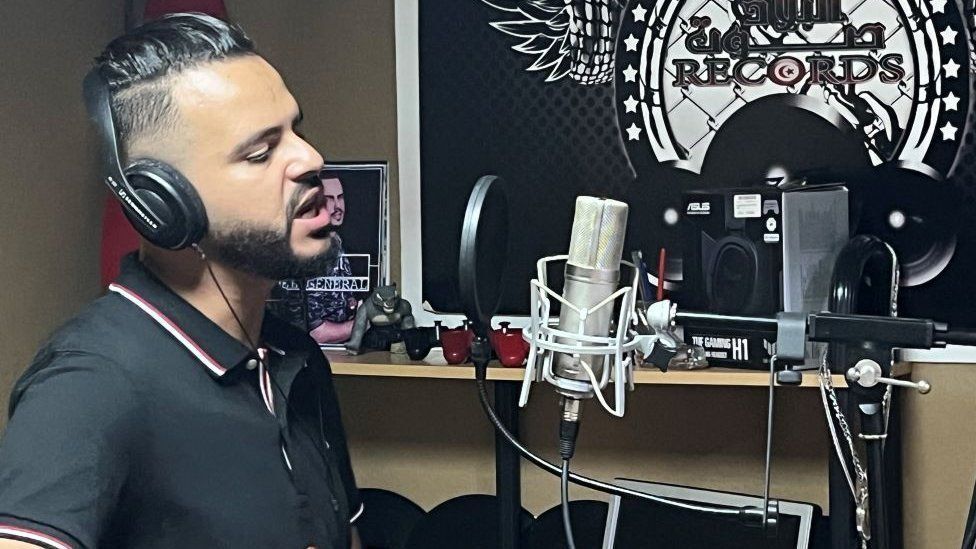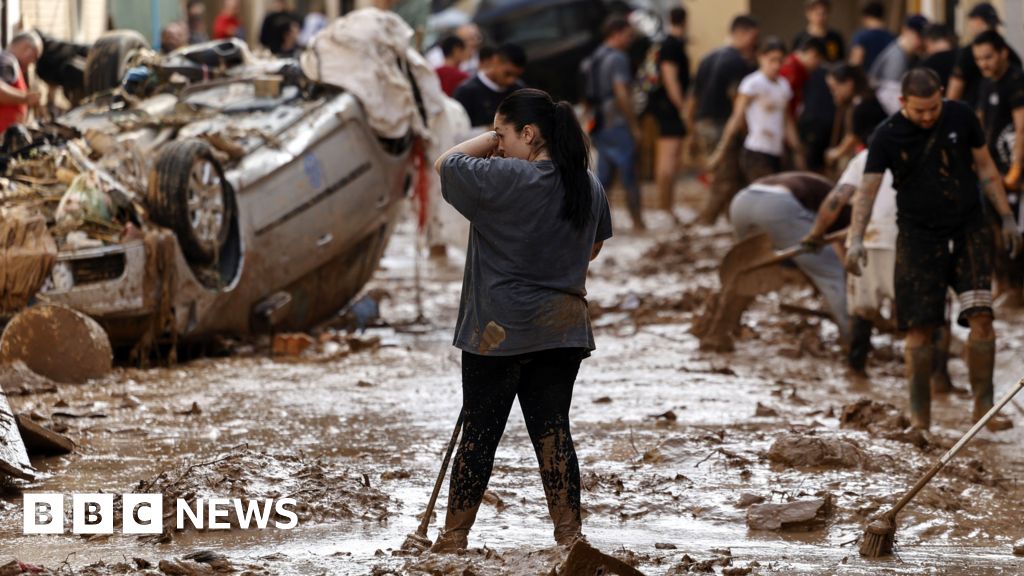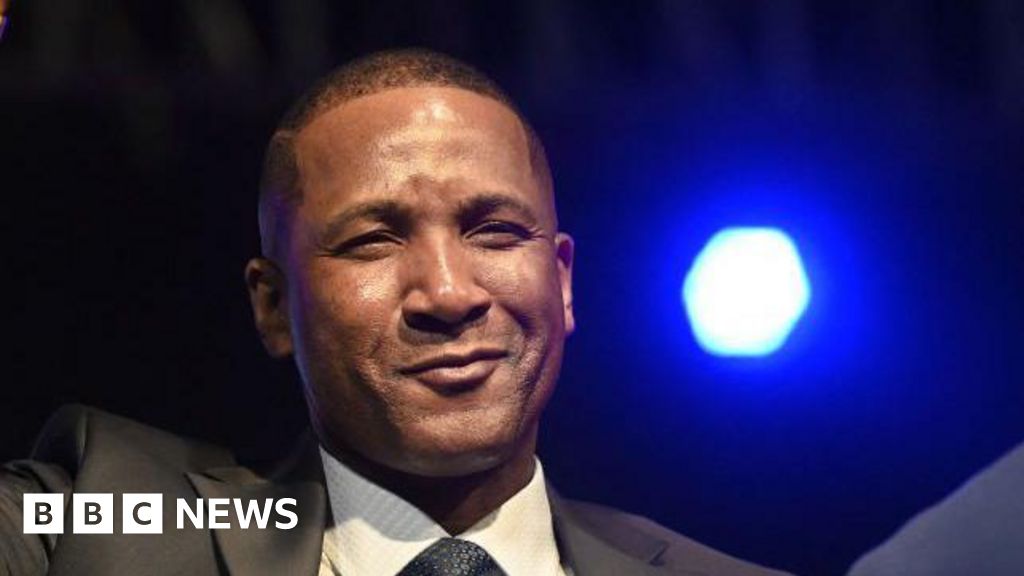ARTICLE AD BOX

By Mike Thomson
BBC News, Tunis
Tunisian rapper El General was just 21 when his haunting, raw video Rais Lebled, or Mr President, went viral in late 2010.
Standing in a darkened, sewage strewn alley - festooned in graffiti - he ripped into the country's then dictator, Zine al-Abidine Ben Ali - in a way none had dared before.
Born Hamada Ben Amor, the fiery young man's explosive song gave voice to the anger, frustration and despair of a whole generation.
"I knew there would be consequences, which scared me due to my young age. I realised the danger of what I had done," he tells the BBC.
El General was fast becoming famous but with his baseball cap pulled down low of his forehead, few knew his real identity. However, with chanting protestors bellowing his song throughout the country, El General's cover was eventually blown and he was arrested.
"I thought this is the end, you know, because at that time if you went into the Ministry of Interior you wouldn't come out again."
Thankfully and perhaps surprisingly, El General was freed after a few days. By this point his song was not only a revolutionary anthem in Tunisia but had become a rallying cry for pro-democracy protesters across the Middle East, from the streets of Egypt to the souks of Bahrain.
El General's face adorned the front page of Time magazine, which listed him among the 100 most influential people in the world.
El General is now married, and lives with his family in an upmarket suburb of the capital
By mid-January 2011, Ben Ali had fled the country. El General and all those who took to the streets in what became known as the Jasmin Revolution had won.
Unfortunately, democracy was to prove a big disappointment to many in Tunisia. Although it survived there, unlike in other countries that rose up during the Arab Spring, successive governments did little to improve the lot of most Tunisians.
Most politicians came to be viewed as more interested in pointless squabbling and their own self-importance than rescuing a nosediving economy. Democracy was soon seen by many as synonymous with anarchy, political inertia and the collapse of law and order.
All of which led to the landslide victory of Kais Saied in the 2019 presidential election. The balding former law professor promised to rescue the country from political and economic chaos. What followed is described by his critics as akin to a coup.
After suspending parliament in July 2021, the populist president went on to give himself the powers to rule by decree. Soon after that he scrapped parliament, which has since been replaced by a feebler version, largely stripped of powers to oppose the president.
Mr Saied went on to dissolve the High Judicial Council, which guarded the independence of the courts, before sacking more than 50 judges.
Last year Mr Saied rewrote the constitution after winning a referendum, which had been boycotted by most opposition groups, amassing even more power for himself. Next came the arrest of dozens of those who have opposed him, from politicians, lawyers and journalists to academics and activists.
To El General, the clock appears to be turning right back to the days of fear and repression.
"We are more under control than ever. We don't know if we're living in the present or back in 2010. I'm one of many who feel our country is in danger. We are still in shock. We didn't expect this level of repression."
While Mr Saied has been largely effective in supressing dissent, he has had much less success in keeping prices down.
Inflation is pushing many foods beyond the price of even middle-class Tunisians and there are severe shortages of staples like rice, sugar and oil. All of which, one market vendor lamented, is forcing some people to sift through roadside rubbish for food.
Image source, Getty Images
Image caption,Kais Saied was a publicity-shy professor who became president
Nowhere is the rise in poverty more evident than in the struggling suburb of Ettadhamen in the capital, Tunis, where youth unemployment is particularly rife.
With drug abuse soaring, a gym owner there, who preferred not to be identified, has begun offering kick-boxing classes. He hopes this will give young people some pride and an interest in something other than narcotics.
One young man, sweating heavily from a vigorous work-out, explained that he aimed to get to the top of the sport, so that he could compete in kick-boxing competitions in Europe. The idea being to jump ship as soon as he got there.
"If I get the chance to go abroad and box, the first thing I'll do is think of a way to stay there. I can't lie, if I find a way to do this I won't come back."
Sadly for him, the gym owner later revealed that the sport's authorities have got wise to wise to such schemes.
He said they were now taking the passports of Tunisians competing overseas and escorting them to and from competitions.
Thousands of other desperate Tunisians are joining soaring numbers of migrants from sub-Saharan Africa in trying to reach Europe in small makeshift boats.
Sadly many don't make it. Since 2014 nearly 28,000 people have died attempting to cross the Mediterranean illegally.
Many do survive the extremely dangerous journey. So far this year more than 60,000 migrants have arrived in Italy, double the number for the same period in 2022.
As the numbers grow, so does the EU's determination to stop them coming. This is proving quite an earner for the Tunisian leader.
Despite saying earlier this year that he was not willing to act as Europe's border guard, earlier this week Mr Saied accepted about $118m (£90m) from the European Union (EU) to help combat Tunisia's people-trafficking trade.
A further $1bn is being offered by the EU for investment in Tunisia. This, though, is dependent on Mr Saied agreeing to the terms of a $2bn bail-out package from the International Monetary Fund (IMF). So far he has refused to do that.
The IMF deal requires him to cut costly subsidies and slim down the bloated government workforce, which Mr Saied knows will be highly unpopular and could even lead to another uprising, this time against him.
For the time being at least Mr Saied remains surprisingly popular, though there are growing numbers of people who are deeply worried about the direction he is taking the country. From incendiary speeches about migrants and the jailing of his political opponents, to his deliberate enfeebling of parliament and the judiciary.
Image source, Getty Images
Image caption,The mass dismissal of judges by the president caused outrage in Tunisia
One such person is El General, though times have changed. Since the huge success of his uprising anthem, he has got married and settled down to raise his family.
The former firebrand now lives in a large imposing house in one of Tunis's upmarket suburbs.
Having watched his country fall victim to growing repression all over again, El General says he felt compelled to return to song-writing.
His insists the lyrics of his latest release include criticism of Mr Saied, though this time it is certainly no revolution rap.
It seems El General is content to leave this fight to a new generation of rappers, who perhaps have a little less to lose.
"El General will always be El General, but maybe there is someone who would now be more revolutionary than me. Like in football, for example, we say Lionel Messi is the best of the best, and maybe in a few years there will be someone playing football better than him."
You can listen to Mike Thomson's report on the BBC World Service's Assignment programme

 1 year ago
91
1 year ago
91








 English (US)
English (US)